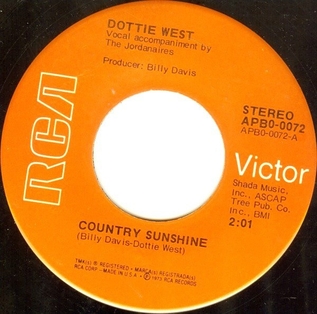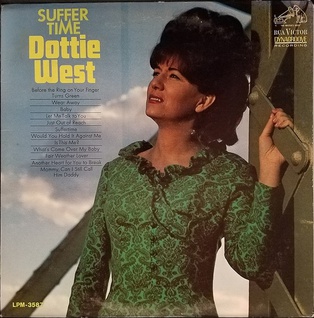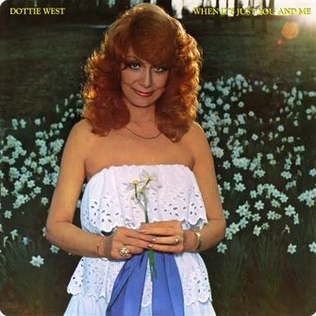Related Research Articles

Dottie West was an American country singer and songwriter. She also had several credits as an actress. A distinguished figure in the country genre, West was among several people who helped to elevate the platform of female country artists. She was also known for mentoring up-and-coming artists and being the first woman to win a country music accolade from the Grammy Awards.

"Country Sunshine" is a song co-written and recorded by American country music artist Dottie West. It was both a Coca-Cola ad jingle and a single. The song was co-written by West, along with Billy Davis and Dianne Whiles. Its popularity as a commercial jingle led to its single release by RCA Victor in 1973. The single became among West's commercially-successful releases, reaching the top ten of the US and Canadian country charts. It also made positions on other genre charts in both countries. "Country Sunshine" has since been considered among West's most well-known recordings.

Suffer Time is a studio album by American country music artist Dottie West. It was released in July 1966 on RCA Victor Records and was produced by Chet Atkins. It was West's third studio album as a music artist and was her first concept album in her career. The record's concept focused on themes related to heartbreak and lost love. It included new compositions and cover versions of other recordings. These recordings included four singles, including the top ten hit "Would You Hold It Against Me". Suffer Time would become one of West's most successful and highest-selling albums in her career.

With All My Heart and Soul is a studio album by American country music artist Dottie West. It was released in January 1967 on RCA Victor Records and was produced by Chet Atkins. It was West's fourth studio album as a recording artist after having her first major hit in 1964. The album included 12 tracks, including the single "Paper Mansions". The song became a top ten hit on the Billboard country chart following its release. The album itself would also chart on a similar Billboard country albums survey.

Here Comes My Baby is a studio album by American country music artist Dottie West. It was released in June 1965 on RCA Victor Records and was produced by Chet Atkins. It was West's debut studio album as a recording artist and was issued following the success of the title track in 1964. The latter song won a Grammy Award in early 1965 which prompted the issue of the album. Here Comes My Baby would start a series of studio recordings West would release for RCA.

When It's Just You and Me is a studio album by American country artist Dottie West. It was released in July 1977 via United Artists Records and contained 11 tracks. It was the 24th studio album in West's career and her first for the United Artists label. Of its 11 songs, four of them were spawned as singles: the title track, "Every Word I Write", "Tonight You Belong to Me" and "That's All I Wanted to Know". The title track reached the top 20 on the US and Canadian country singles charts. The album was reviewed positively by Billboard magazine following its original release.

Makin' Memories is a studio album by American country music artist Dottie West. It was released in December 1969 on RCA Victor Records and was produced by Danny Davis. Her thirteenth studio album, Makin' Memories was also her third to be released in 1969. The album included three singles that became minor hits on the national music publication charts.

The singles discography of American country artist Dottie West contains 59 singles released as a solo artist, 12 singles released as a collaborative artist, 3 promotional singles and 1 other charting song. West signed with RCA Victor Records in 1963, having her first Top 40 hit the same year. It was followed in 1964 by "Love Is No Excuse", a duet with Jim Reeves that became West's first top 10 hit. In 1964, she also released "Here Comes My Baby". The song reached number 10 on the Billboard Hot Country Singles chart and became the first song by a female country artist to win a Grammy award. From her 1966 album, West issued four singles, including the top 10 hits "Would You Hold It Against Me" and "What's Come Over My Baby". Over the next two years she had major hits with "Paper Mansions", "Like a Fool", "Country Girl", and "Reno". In 1969, West collaborated with Don Gibson on "Rings of Gold", which reached number 2 on the Billboard country chart. In 1973, she released a single version of a commercial jingle originally used by The Coca-Cola Company. Entitled "Country Sunshine", the song became West's biggest hit, reaching number 2 on the country songs chart and number 49 on the Billboard Hot 100. The song also nominated her for her eleventh Grammy. After releasing the top 10 hit "Last Time I Saw Him" (1974), West's chart hits declined and she was dropped from RCA in 1976.

The albums discography of American country artist Dottie West contains 28 studio albums as a solo artist, five studio albums as a collaborative artist, 18 compilation albums and additional album appearance. Among West's studio releases were five collaborative albums with various artists, including Kenny Rogers. After signing with RCA Victor Records in 1963, West released her debut studio album Here Comes My Baby (1965). The album peaked at number 12 on the Billboard Top Country Albums chart in July 1965. West's third studio album Suffer Time (1966) spawned four singles, including "Would You Hold It Against Me", a top 5 hit on the Billboard Hot Country Songs chart. Suffer Time would reach number 3 on the country albums chart, West's highest-charting solo album. Between 1967 and 1968, West released 5 more studio albums. With All My Heart and Soul (1967) featured the top 10 hit "Paper Mansions" and the album itself peaked at number 8 on the Top Country Albums list. In 1969, she paired with Don Gibson for her first collaborative project Dottie and Don. The album featured the pair's number 2 Billboard country hit "Rings of Gold". In 1970, she collaborated with Jimmy Dean on the studio release Country Boy and Country Girl. In 1973, West had her biggest hit with the single "Country Sunshine". Its corresponding album of the same name peaked at number 17 on the country album chart in February 1974.
"Let Me off at the Corner" is a song written by Lou Meredith and Larry Kronberg, and recorded by American country music artist Dottie West. It was released in August 1963 and became the first single to chart in West's music career, reaching the top 40 of the American country chart.
"Gettin' Married Has Made Us Strangers" is a song written by Gary Geld and Pete Udell, and recorded by American country music artist Dottie West. It was released in March 1965 as the first single from the album Dottie West Sings. The song became a top 40 chart single on the US country music chart.
"No Sign of Living" is a song written by Mirriam Eddy, also known as Jessi Colter, and recorded by American country music artist Dottie West. It was released in July 1965 as the second single from the album Dottie West Sings. The song became a top 40 chart single on the US country music chart.
"Before the Ring on Your Finger Turns Green" is a song written by Felice and Boudleaux Bryant, and recorded by American country music artist Dottie West. It was released in Novemberr 1965 as the first single from the album Suffer Time. The song became a top 40 chart single on the US country music chart.
"Mommy, Can I Still Call Him Daddy" is a song by American country music artist Dottie West. It was released as in July 1966 as the third single from the album Sufffer Time The song, written by West and her then-husband Bill West, became a top 40 chart single on the US country music chart and featured West's son Dale singing on the chorus.
"Childhood Places" is a song written by Barry Mason and Les Reed, and recorded by American country artist Dottie West. It was released in November 1967 and became a top 40 chart single on the US country music chart. It was among a series of top 40 single releases by West during the 1960s. It was given positive reviews by critics and publications.
"It's Dawned on Me You're Gone" is a song written by Hank Cochran and Red Lane, and recorded by American country music artist Dottie West. It was released in July 1970 as the first single from the album Country and West. The song became a top 40 chart single on the US country music chart. It was given positive reviews by Billboard and Cashbox following its release.
"Forever Yours" is a song written by Jimmy Peppers, and recorded by American country music artist Dottie West. It was released in October 1970 as the first single and title track from the album Forever Yours. The song became a top 40 chart single on the US country music chart. It was given positive reviews by Billboard and Cashbox following its release.

"If It's All Right with You" is a song written by Kenny O'Dell and Larry Henley, and recorded by American country music artist Dottie West. It was released in October 1972 as the first single from the album If It's All Right with You/Just What I've Been Looking For. The song reached the top 40 of the US country chart and the top 100 of the US Hot 100. It was given positive reviews by Cashbox following its release.
"House of Love" is a song written by Kenny O'Dell, and recorded by American country music artist Dottie West. It was released in June 1974 as the second single and title track from the album House of Love. The song reached the top 40 of the US country chart. It was given positive reviews following its release.
"Lay Back Lover" is a song written by Rafe Van Hoy and Steve Pippin, and recorded by American country music artist Dottie West. It was released in November 1974 as the third single from the album House of Love. The song reached the top 40 of the US country chart. It was given positive reviews following its release.
References
- 1 2 "Here Comes My Baby: Dottie West: Songs, reviews, credits". AllMusic . Retrieved 29 October 2023.
- ↑ Jurek, Thom. "RCA Country Legends: Dottie West: Songs, reviews, credits". AllMusic . Retrieved 29 October 2023.
- ↑ Ankeny, Jason. "Dottie West Biography". AllMusic . Retrieved 29 October 2023.
- 1 2 3 West, Dottie (November 1964). ""Didn't I"/"In Its Own Little Way" (7" vinyl single)". RCA Victor . 47-8467.
- ↑ Whitburn, Joel (2008). Hot Country Songs 1944 to 2008. Record Research, Inc. ISBN 978-0-89820-177-2.
- ↑ "Dottie West Chart History (Hot Country Songs)". Billboard. Retrieved October 29, 2023.